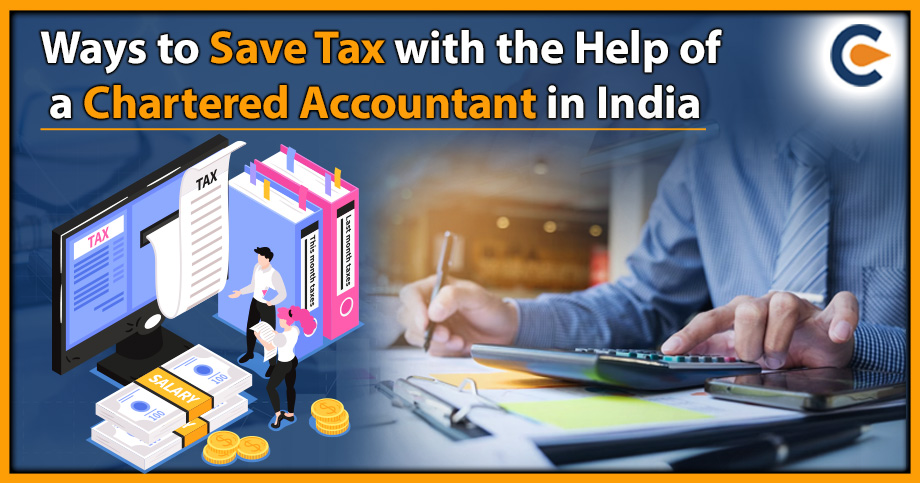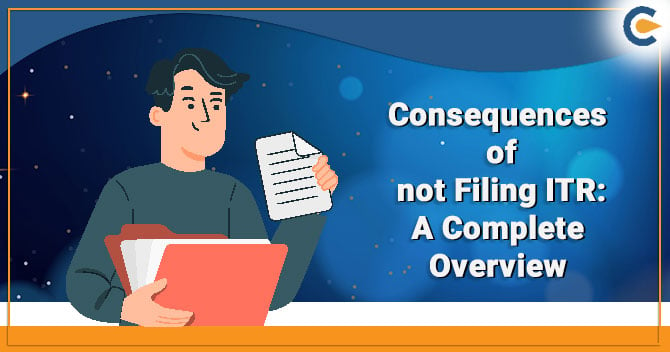Being a Chartered Accountant (CA) in India is essential for tax planning and savings. CAs are financial experts with the training and qualifications to offer tax-related services to individuals, companies, and organizations. They can assist their clients in effectively planning their finances, reducing their tax liabilities, and maximizing their tax savings since they have the technical knowledge and skills needed to manage complicated tax laws and regulations in India. In this blog, we will discuss different ways to save tax with help of a CA in India.
A CAs role in tax planning is to assess their client’s financial status and locate potential tax-saving options. They can assist their clients in comprehending the numerous legal deductions and exemptions. The role of a CA in tax planning is to advise and direct their clients all year long. They assist their clients in making financial decisions, such as investments and expenditures that will reduce their tax obligations and increase tax savings. Giving guidance on the timing of investments, the structure of financial transactions and other aspects that can affect tax liability.
Importance of Tax Planning and Saving In India – Ways to Save Tax
In India, tax preparation and planning are of the greatest significance. Every individual is required to pay taxes depending on their income and other financial activity, and a major source of income/revenue of the government comes from Taxes. Tax planning entails setting up one’s finances in a way that ensures compliance with the laws while paying the least amount of tax feasible. On the other hand, tax savings means using legal deductions and exemptions to lower the tax liability.
Planning your taxes wisely helps both people and corporations get the most out of their money and reach their financial objectives. Tax planning is essential for everyone who makes earns a salary or has financial assets. Due to the intricate and often changing tax regulations in India, tax preparation might be extremely crucial. Long-term savings from tax reductions can be significant. The Indian government provides a range of tax-saving tools, including tax-saving mutual funds, the national pension plan, the public provident fund, life insurance policies and more that can help people reduce their tax liabilities while still earning profits on their investments. Financial stability and security can be attained by wise tax planning and saving, as well as long-term financial objectives like buying a house or saving for retirement. Ultimately, tax planning and savings are crucial for every citizen and company.
Ways to Save Tax with the Help of a Chartered Accountant
Below are some ways in which you can save taxes:-
- Section 80D of Income Tax Act –
Deduction for money spent on medical insurance and on maintaining health. Medical insurance premiums and expenditures for routine checks can be written off as tax deductions under section 80D of the act. This section was included to encourage people to take care of their health and to promote preventative healthcare practices. Individuals can deduct up to Rs. 25,000 for themselves, their spouse and their children. At the same time, senior citizens who are a policyholder or family members are eligible for deductions up to Rs. 50,000. Here, parents below the age of sixty years are not eligible. Those who have high premiums for medical insurance plans can save a lot of money on taxes because of the tax deduction allowed under section 80D. Individuals can preserve their health and lower their tax obligations by utilizing this provision.
- Section 80CCC of Income Tax Act – Payment of life insurance
Individuals who invest in annuity plans provided by insurance companies are eligible for tax benefits under section 80CCC of the act. An individual can save on taxes while simultaneously planning for their retirement by investing in an annuity plan. An annuity plan is a versatile investment and a long-term financial option that provides the investor with a guaranteed income.
- Section 10 of the Income Tax Act – Best Way to Save Tax
This section offers exemptions on many forms of income, including agricultural income, life insurance income, the exemption for education expenses, gratuities, leave encasements, etc.
- Section 80C of the Income Tax Act
One of the best methods to save tax is to invest your money in tax-saving instruments. You can deduct up to Rs. 1.5 lakh in taxes according to section 80C of the act. You can invest in the following things:- National Saving Certificate (NSC) – The Indian government offers a well-known investing programme called the National Savings Certificate (NSC). It is a fixed-income investment aimed at encouraging small savings. The NSC is a risk-free investment choice with guaranteed earnings. The Section 80C of Income Tax Act, the investment in NSC is eligible for a tax deduction. The NSC interest earned is likewise taxed under the “Income from Other Sources” category. The ability to serve as collateral for loans from banks and other financial organizations is one of the distinctive qualities of NSC. They have a minimum five-year lock-in period. Up to 8% in yearly interest payments are compounded.
- National Pension Scheme (NPS) – The Indian government introduced the National Pension Plan (NPS), a voluntary contributory pension plan, in 2004. The program’s goal is to give both organized and unorganized sector workers retirement income. Individuals are allowed to put a specific amount of their salary into retirement savings under the NPS. The Pension Fund Regulatory and Development Authority (PFRDA)[1], which oversees the programme, offers two types of accounts: Tier 1 and Tier 2. The first is a required account and only allows withdrawals following the retirement process. Under Section 80C of the Income Tax Act, contributions paid to the programme are eligible for a tax deduction of up to Rs. 1.5 lakh.
- Employee Provident Fund (EPF) – The Indian government established the Employee Provident Fund (EPF) as a savings scheme to ensure the financial stability of its employees after retirement. A percentage of an employee’s pay is placed into an EPF account under this scheme, coupled with an equivalent contribution from the employer. 12% of the base wage and Dearness Allowance are withheld by the employer (DA). The money is subsequently put in provident funds recognized by the government. Employees can reduce their tax liability by making contributions to the EPF since they are tax deductible under Section 80C of the Income Tax Act.
- Voluntary Donations – Giving back to society and supporting issues that matter to you are both accomplished through voluntary donations. The Indian government offers tax advantages for voluntarily made gifts as a way to encourage people to support charitable activities. Under Section 80G of Income Tax Act of 1961, you may deduct the amount you gift to a recognized charity organization.
- Home Loan – Saving taxes on mortgages is a widespread strategy that can assist people in lowering their tax obligations. Under several parts of the Income Tax Act of 1961, the repayment of the principal and interest component of a house loan may qualify for tax deductions. Section 24 of Income Tax Act allows for the deduction of the interest component of a house loan. Section 80C of Income Tax Act, the principal portion of the mortgage may be deducted.
- By keeping their money in the business rather than declaring their income, the person who starts his own business can avoid paying income taxes.
- If the kid is under the age of 17, parents may save money by adopting some child’s plan, and if the child is enrolled in college, parents can claim the money as tuition fees in order to receive income tax relief.
- A mortgage interest that is tax deductible indicates that homeowners will profit from the tax if they hold their mortgage for a long time.
Different Factors To Consider While Choosing A CA for Tax Planning – Ways to Save Tax
When it comes to tax planning, taking the help of a Chartered Accountant (CA) can be a smart move. However, it’s essential to choose the right CA to save tax and ensure effective tax planning. Here are some factors to consider while choosing a CA for tax planning:
- Qualification and Experience: The first thing to consider is the qualification and experience of the CA. Check if the CA is a member of Institute of Chartered Accountants of India and, has a valid certificate of practice. Also, consider the CA’s experience in tax planning and saving.
- Reputation: The reputation of the CA is another essential factor to consider. Check the CA’s online presence and reviews from previous clients to get an idea of its reputation. Additionally, you can ask for referrals from friends or family members who have used the services of the CA before.
- Fees: The fees charged by the CA should also be taken into consideration. It’s essential to get a clear understanding of the fees and charges involved in tax planning and saving before engaging the services of a CA.
- Availability and Communication: The availability and communication skills of the CA are also necessary. Make sure the CA is accessible and can be reached easily if you have any questions or concerns. Additionally, the CA should communicate complex tax-related information, in a easy way which helps in understanding.
- Specialization: Some CAs specialize in specific areas of taxation, such as corporate taxation, individual taxation, or international taxation. Consider your specific tax planning needs and choose a CA with expertise in that area.
- Ethics: Finally, it’s essential to choose a CA with high ethical standards. Check if the CA has any history of unethical practices or disciplinary actions taken against them by ICAI.
Conclusion
Considering that taxes make up a sizable amount of the government’s revenue in India, tax planning and saving are essential. You can benefit from tax saving instruments available by working with a chartered accountant, including NSC, PPF, etc., as well as other deductions and exemptions under the Income Tax Act. A chartered accountant can also assist in understanding the complex tax rules and regulations of India and offer services that can help you save money. A CA’s assistance can make tax planning, which takes place throughout the year, simpler and more efficient.
Also Read:
Reduce Your Income Tax Liability To Save Money For Your Future
Income Tax Return E-Filing: Things You Must Know
Deduction Of 80C, 80CCC & 80CCD Under Income Tax











